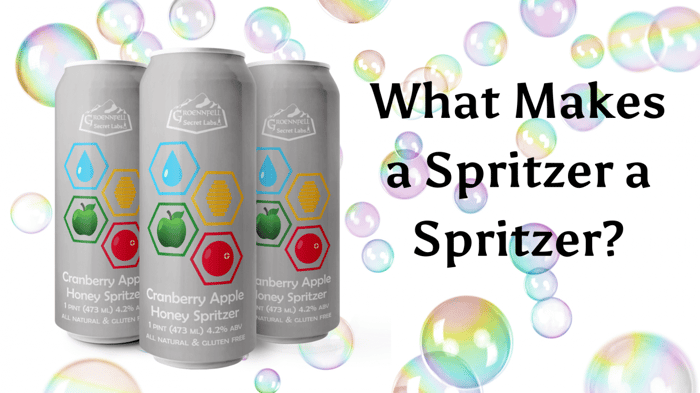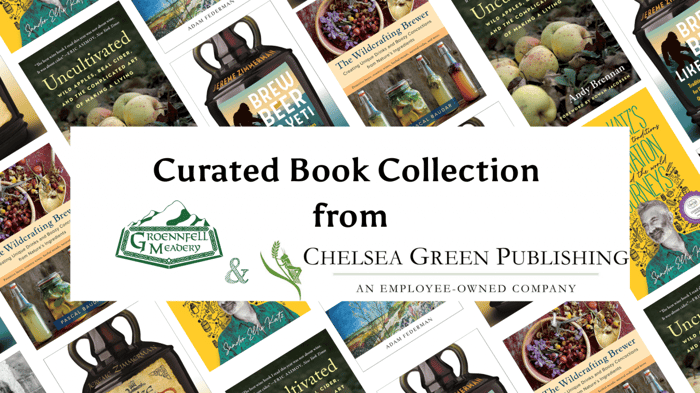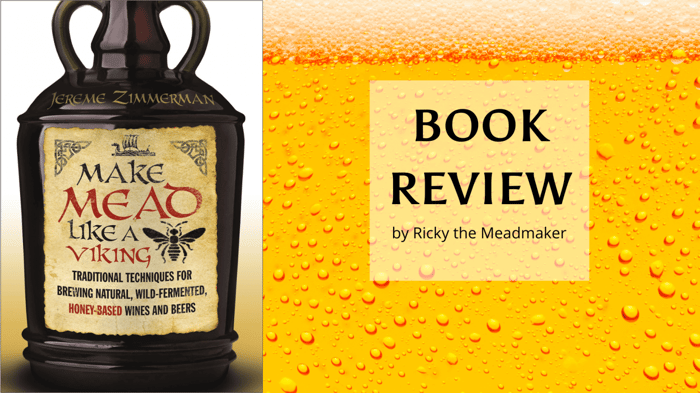After launching Batches 001 and 002 from Groennfell Secret Labs, we’ve been getting a lot of questions about what exactly makes a spritzer a spritzer.
The answer is a little more complicated than you’d think.

The first important thing to know is that all alcoholic beverages in the United States are classified by the Federal Government using a variety of metrics. (Specifically, these regulations come from the TTB, the Alcohol and Tobacco Tax and Trade Bureau.) At the top level, they break all beverages into three categories: Beer, Wine, and Spirits.
If it’s made from grain, it’s beer. If it’s not made from grain and not distilled, it’s wine. If it’s distilled no matter what the base ingredient is, it’s a spirit.
There are two specific category-bending products: sake (which is a beer while it’s fermenting but a wine once it’s packaged) and cider which has its own special problems. Otherwise, everything gets shunted into one of the above superclasses.
Mead? It’s a wine. Fermented raisin concentrate? It’s a wine. Vodka, cranberry juice, and water? That’s a spirit. Sugar, cranberry juice, and water fermented… this is where the trouble begins.
You can make a rutabaga wine by adding sugar to rutabaga juice to get it up to an appropriate starting gravity (to obtain a wine-level alcohol content), even if it means that there’s substantially more sugar coming from a bag than from the rutabaga. This, of course, ignores the question of why you’re making a rutabaga wine, but we’ll assume it’s an old family recipe and move on.
You pay wine excise taxes for your Rutabaga Wine. You can ship your Rutabaga Wine direct to consumers under a wine-shipping license. The state of Connecticut will insist that you sell your Rutabaga Wine only in Wine and Spirit shops and not alongside beer.
So why, then, if you add the same amount of sugar to ginger does it come out as ginger beer? You have, somehow, made a ginger beer that follows all the regulations, taxes, and laws governing beer.
I’m terribly sorry to say that the answer from the Federal Government is: “Cuz we said so.”
Oh, and you can also make ginger wine. Root of All Evil is neither a ginger wine nor a ginger beer because honey changes the game yet again. Due to the scope of this article and the blood pressure of the author, we’re going to ignore this fact and steam ahead.
In addition to these superclasses, they pick and choose what subclasses they care about. They have a strict say over wine varietals and classifications, but absolutely nothing to say about beer styles. Spirits are strictly defined, but in some cases in direct contradiction to the way the rest of the world defines them. They also maintain a list of known cocktails, but it appears it hasn’t been updated since Lyndon B. Johnson’s presidency.
The reason that all of this matters is that many of the regulations are merely decisions and not enshrined in law, meaning they’re liable to change and are open to individual interpretation. Once in a while, however, a new category comes along that forces their hand. The explosion of alcoholic seltzers was one of these occasions.
In a white paper, available here, they have the following:
TTB regulations do not define of any of these terms:
-
Hard seltzer
-
Alcoholic seltzer
-
Spiked seltzer
-
Hard sparkling water
Which isn’t quite true, because they then go on to say:
Frequently, products sold as hard seltzer or similar names are classified as beer (vs. wine or distilled spirits)
-
If made with both malted barley and hops they are classified as beer under the Internal Revenue Code and malt beverages under the Federal Alcohol Administration Act
-
If not made with both malted barley and hops they are classified as beers that are not malt beverages
-
For example, products made from fermented sugar or from malted barley but not hops
This is why, if you look really hard at a can of hard seltzer, you’ll find the word beer somewhere on the can. They hide it the best they possibly can, but it’ll be there.
Why do they want to be beer so badly? There are a lot of reasons. One of the big ones is that it allows them to use flavorings and colorants and not list it on the packaging. They can also make up their own nutrition panels and not abide by food labeling laws. They can use pure sugar, which is the cheapest brewing ingredient available thanks to massive sugar beet subsidies.
So, with nothing else to go on, the TTB turns to the industry itself and says “Based on industry publications, hard seltzers are most commonly: carbonated water, flavoring, and alcohol, made from fermented sugar or malted barley.”
We were back in the same spot we were in ten years ago when we were trying to figure out what to call our type of mead in general. When people hear mead, they often think of stronger meads that come in bottles. While we do have the Ancient Collection now, for years we only produced craft mead. In fact, we came up with that term to help folks know what to expect when they grab a can of our product.
Now what to call a light, crushable mead in a can with lower abv than a lot of the craft mead out there?
After considerable discussion, we settled on the term “spritzer.”
It checks a lot of boxes for us:
-
The term isn’t rigorously defined.
-
No one is claiming to have the one true spritzer on the market.
-
It has a sense of being light and bubbly.
-
Although it has a secondary meaning of mixing seltzer with wine, who actually does that these days?
-
It’s fun to say!
The answer, then, if you’ve made it this far is: We’ve decided that a spritzer is a type of alcohol made from honey, apples, or another fruit that’s naturally fermented, dry, and 4% - 5% abv.
We’re not going to trademark it or anything, we’d love to see what other mead makers have to add to the category. And as for us, we have many more projects in the Groennfell Labs.
If you want the inside scoop on what we’re cooking up, you can check out Ricky’s Brew Journal. If you just want to try a spritzer for yourself, that’s also fine by us!




